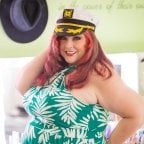-
Trending Products
-
Trending Topics
-

- 10,047 replies
- 1,043,872 views
-

Report Your WINS ..What is your today's win??🥇
By Mspretty86, in Rants & Raves
- gastricsleeve
- vsg
- (and 1 more)
- 329 replies
- 39,812 views
-
-
Recent Status Updates
-
On day 4 of the 2 week liquid pre-op diet. Surgery scheduled for June 11th.· 0 replies
Soooo I am coming to a realization
of something and I'm not sure what to do about it. For years the only thing I've enjoyed is eating. We rarely do anything or go anywhere and if we do it always includes food. Family comes over? Big family dinner! Go camping? Food! Take a short ride or trip? Food! Holiday? Food! Go out of town for a Dr appointment? Food! When we go to a new town we don't look for any attractions, we look for restaurants we haven't been to. Heck, I look forward to getting off work because that means it's almost supper time. Now that I'm drinking these pre-op shakes for breakfast, lunch, and supper I have nothing to look forward to. And once I have surgery on June 11th it'll be more of the same shakes. Even after pureed stage, soft food stage, and finally regular food stage, it's going to be a drastic change for the rest of my life. I'm giving up the one thing that really brings me joy. Eating. How do you cope with that? What do you do to fill that void? Wow. Now I'm sad.- This update has no replies.
-
On day 4 of the 2 week liquid pre-op diet. Surgery scheduled for June 11th.· 1 reply
Soooo I am coming to a realization
of something and I'm not sure what to do about it. For years the only thing I've enjoyed is eating. We rarely do anything or go anywhere and if we do it always includes food. Family comes over? Big family dinner! Go camping? Food! Take a short ride or trip? Food! Holiday? Food! Go out of town for a Dr appointment? Food! When we go to a new town we don't look for any attractions, we look for restaurants we haven't been to. Heck, I look forward to getting off work because that means it's almost supper time. Now that I'm drinking these pre-op shakes for breakfast, lunch, and supper I have nothing to look forward to. And once I have surgery on June 11th it'll be more of the same shakes. Even after pureed stage, soft food stage, and finally regular food stage, it's going to be a drastic change for the rest of my life. I'm giving up the one thing that really brings me joy. Eating. How do you cope with that? What do you do to fill that void? Wow. Now I'm sad.-
Life as a big person had limited my life to what I knew I could manage to do each day. That was eat. I hadn't anything else to look forward to. So my eating choices were the best I could dream up. I planned the cooking in managable lots in my head and filled my day with and around it.
Now I have a whole new big, bigger, biggest, best days ever. I am out there with those skinny people doing stuff i could never have dreamt of. Food is now an after thought. It doesn't consume my day. I still enjoy the good home cooked food but I eat smaller portions. I leave food on my plate when I am full. I can no longer hear my mother's voice saying eat it all up, ther are starving children in Africa who would want that!
I still cook for family feasts, I love cooking. I still do holidays but I have changed from the All inclusive drinking and eating everything everyday kind to Self catering accommodation. This gives me the choice of cooking or eating out as I choose. I rarely drink anymore as I usually travel alone now and I feel I need to keep aware of my surroundings.
I don't know at what point my life expanded, was it when I lost 100 pounds? Was it when I left my walking stick at home ? Was it when I said yes to an outing instead of finding an excuse to stay home ? i look back at my last five years and wonder how loosing weight has made such a difference. Be ready to amaze yourself.
BTW, the liquid diet sucks, one more day and you are over the worst. You can do it.
-
-
Three months and four days ago... I was in Costa Rica having a life changing surgery! Yesterday we had a followup visit with Dr. Esmeral via video chat and this morning my middle number changed. I'm down 47lbs and two pants sizes. I can wear a Large tshirt for the first time in like... 14 years! Woot!! Everything is going great. I have zero regrets. I went down to the riverwalk with a friend and walked 2 miles on Monday without even getting fatigued. And no more snoring or chugging pickle juice for crazy leg cramps! I need to go to the gym more... I'm making new shirts next week so that will motivate me. LOL But I'm also just not as TIRED all the time! I have a LONG way to go...but seeing the progress on the scales and in the mirror is a huge motivator!! Thank you all for cheering me on and supporting me!!· 0 replies
- This update has no replies.
-

















